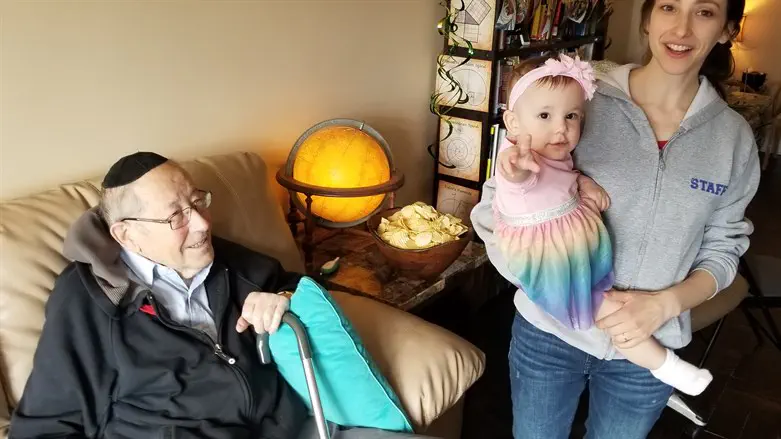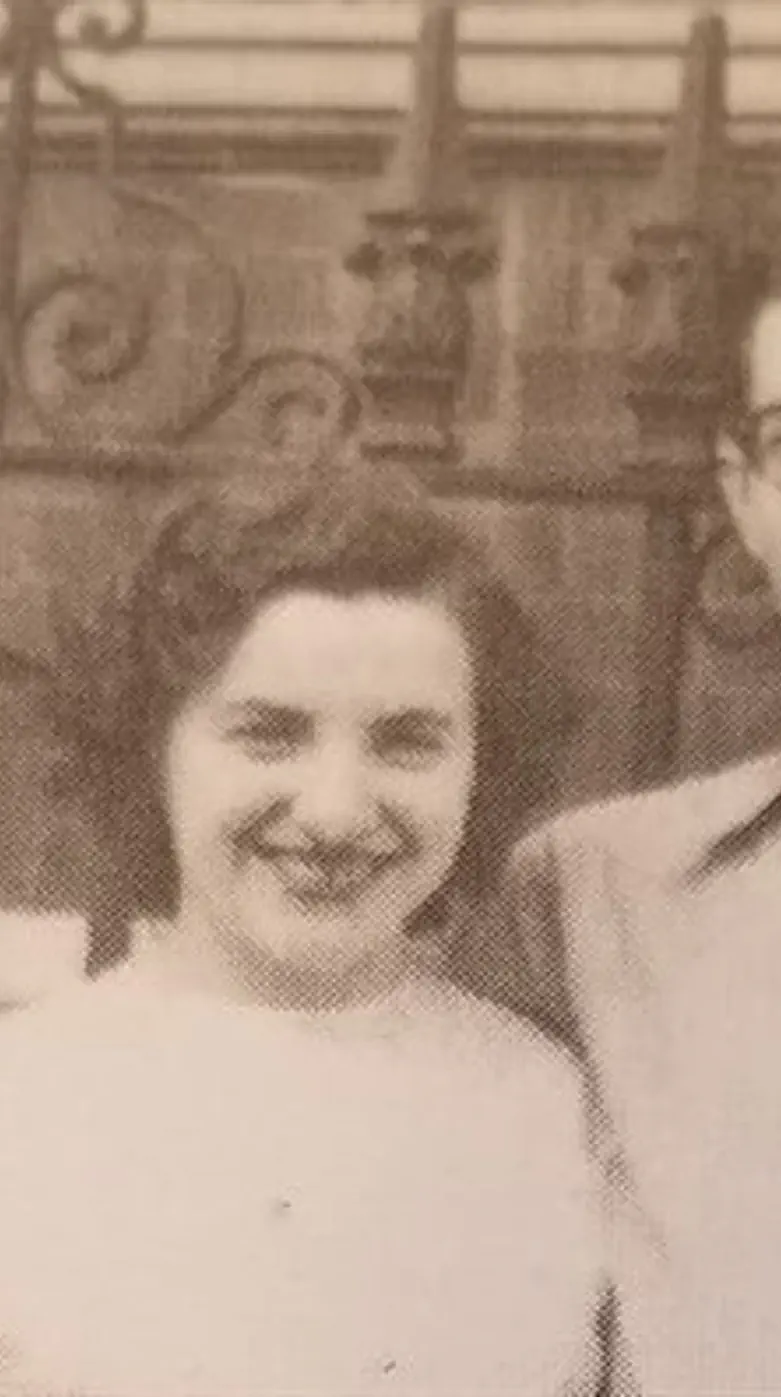
My father was a towering figure and a role model for grit, fortitude, intense family loyalty, and love. He led quite the roller coaster of a life. He was born in 1928 in Kuzmino, then Czechoslovakia. He had a very happy childhood. He lived on a small farm with his father (Nathan), a tailor, his mother (Leah), a homemaker, and an older brother, Herman (Chaim Hersch). In 1939 the Hungarian police knocked on their door and took their father away to enlist him in the Hungarian army/ slave labor unit. In 1943 they were informed that he was sent to the Russian front, and after that, he was never heard from again.
My father was barely eleven when his father was taken away. Their family income immediately ceased, and he and his brother had to step up and fend for themselves and for their mother. They formed a very close bond, and together they surreptitiously cut down trees for firewood to keep their home warm.
The day after Pesach 1944, another knock came on the door by the Hungarian police, and the entire family was told that they had an hour to gather their belongings and that they were going to be taken away to an undisclosed farm to perform labor.
They were then transported by horse and buggy to the Munkatch ghetto, then to the Kutchivo ghetto, and then to another brick factory Pot- Horyan. There the Gestapo took over and put them in a cattle train to Auschwitz. Upon his arrival at Auschwitz, amidst the din and confusion, a Sundercommando whispered to him in Yiddish, Zug as de bist elter (Tell them that you’re older). He had no idea what he was talking about, but when he was paraded before Dr. Mengele, and officers barked at him in German, “Vie Alt?” (How old are you?), he immediately caught on and said, “I am seventeen years old” (He was fifteen). This answer saved his life, and Dr. Mengele waved his shteckle (stick) and shouted: “Link” (left), selecting him for slave labor instead of shouting “Recht” (right), which would have condemned him to the gas chambers.
After Auschwitz, he was transported to Mauthausen and from Mauthausen to Melk, and after Melk was bombed by the Russians, he was transported to Ebensee from where he was liberated. At Melk, he performed slave labor under the code name Operation Quartz, digging underground tunnels for the relocation of the Daimler-Puch Industry, which manufactured roller bearings for Nazi tanks and airplanes. My father worked the twelve-hour day shift, and his brother the night shift. Throughout, my father stayed in communication with his brother until he died unexpectedly in the camp hospital (Revier) one month prior to liberation. His death certificate identified his cause of death as “circulatory insufficiency”. I strongly suspect that he may have been the subject of medical experimentation, but I can’t prove it.
After liberation, my father immediately became febrile and ill with Typhus. He spent four weeks in the hospital getting blood transfusions and intravenous hydration, teetering between life and death. For most of this time, he deliriously shouted at the American Doctors, “Tell me, when am I going to die? When?” He survived. My father’s life was saved yet again.
When his health improved, he went back home to Kuzmino and reunited with his mother, who miraculously survived, and was liberated from Allach, a subcamp of Dachau. They were going to resettle there, but their lives were threatened by the locals, so they made their way to Czechoslovakia, and as the Iron Curtain was falling, they bribed their way with a crate of plum slivovitz into the American Zone of Germany, reaching the Displaced Persons camp at Gaberersee by Wasserburg, and stayed there for four years.
When their visa sponsorship by an uncle came through, they came to the United States of America in 1949 via boat, The US Muir. They docked in Boston, made their way to New Brunswick, where they had relatives, and from there, they journeyed to New York.
His mother, Leah, my grandmother, made his shidduch with my mother (Gittel/Gertrude), who came from the same town. After they married, they struggled financially. My mother worked in a sweat shop, and my father started as a tailor and eventually landed up working in a grocery store. My grandmother, who lived with them, worked as a domestic.
My parents had two children, Carol, my older sister, and me. When it was time to send us to school, there was no question that their children were going to get a Jewish Yeshiva education. They applied for a scholarship at the Washington Heights neighborhood Yeshiva, Yeshiva Rabbi Moses Soloveitchik (YRMS), and were flatly rejected. The principal told them not to worry and that there was a very nice public school down the street.
My parents were insistent. They enrolled us and worked very hard to pay those bills. My father felt he had no choice but to work on Shabbas to pay the bills, ironically so that we could grow up being Shomer Shabbos (Keepers of the Sabbath). This caused him great pain and shame until financial circumstances improved such that he could eventually take Shabbas off.
His mother (Leah), developed a neurological cognitive condition that led to her slow deterioration over many years. He and my mother were extremely devoted to her providing round-the-clock care. He vowed that he would never send his mother to a nursing home, no matter what.
My father was a devoted son, a devoted husband, a devoted father to his two children, a devoted grandfather to his eight grandchildren, and a devoted great-grandfather to his thirteen great-grandchildren. He was always there for his children and grandchildren to provide financial and emotional support. He doted on his multiple grandchildren and great-grandchildren, who provided him with much-deserved nachas and happiness over the years, providing an anodyne for the lengthy period of suffering and deprivation he experienced.
One particular sentence (posuk) from last Shabbat’s second consolation Haftorah after Tisha B’Av, aptly summarized my father’s lifetime experiences:
“Who is among you who fears God, that obeys the voice of his servant? Though he walks in darkness, and has no light, let him trust in the name of God and lean on him” (Isaiah 50:10).
My father, in his early life, walked in one of the darkest and blackest chapters in human history, where there was no apparent light, not even a single ray. When he looked up towards the heavens, his sight was obscured by the black ashen smoke, the remains of his extended family, and millions of Jews spewing out from the crematoria. When he looked at the ground, to the left and to the right, he saw mounds of Jewish corpses stacked up to the heavens. When he inhaled, he smelled an awful mixture of putrid decaying flesh and human excretions. He breathed into his nostrils the genocide of his people.
But nevertheless, (af al pee cain), he had faith (Emunah) and trust (betachon) in G-d Almighty. This enabled him to ultimately walk into the light, survive, and thrive, and pass on his Yiddishkeit onto the third generation.
Four years ago, my mother Gittel died, and this was yet another crushing blow in his life from which I don’t believe he fully recovered. His love for her was so great, his anguish so deep, that as she was being lowered into her burial plot, he started yelling in Yiddish, “der mama is begruben, oy vey, der mamma is begruben” (mother is buried, oy vey mother is buried). He could not come to terms with the reality of her death. He whispered to me that he wished he could jump in, and join her.
He will now be buried by her side and will be enjoined with her eternally in Gan Aiyden (The Garden of Eden), bathing in the eternal supernal numinous light of God. As we say after donning the Talit every morning, key b’ohrcha, neer’eh ohr, (In your light, does light become visible).
He died at the age of 94, in his sleep, on the Sabbath, entering into an eternal Sabbatical menuchah (rest). Thus, he was divinely allotted the much-earned death of a Tzadik (a righteous man).
My father’s entire life set forth a shining example of survival under extreme pressure, perseverance, familial loyalty, and love of God and humanity. His memory and the moral example he set will be cherished by many of us. May his Neshama have an Aliyah.
